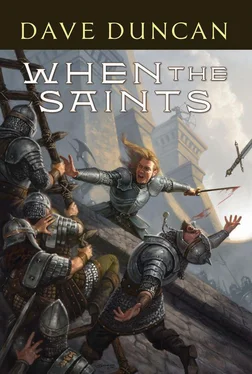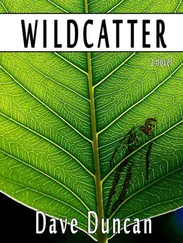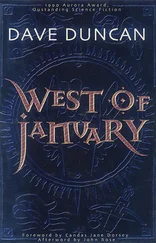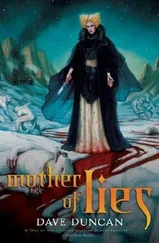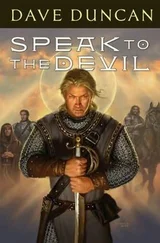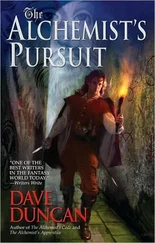Dave Duncan - When the Saints
Здесь есть возможность читать онлайн «Dave Duncan - When the Saints» весь текст электронной книги совершенно бесплатно (целиком полную версию без сокращений). В некоторых случаях можно слушать аудио, скачать через торрент в формате fb2 и присутствует краткое содержание. Жанр: Фэнтези, на английском языке. Описание произведения, (предисловие) а так же отзывы посетителей доступны на портале библиотеки ЛибКат.
- Название:When the Saints
- Автор:
- Жанр:
- Год:неизвестен
- ISBN:нет данных
- Рейтинг книги:4 / 5. Голосов: 1
-
Избранное:Добавить в избранное
- Отзывы:
-
Ваша оценка:
- 80
- 1
- 2
- 3
- 4
- 5
When the Saints: краткое содержание, описание и аннотация
Предлагаем к чтению аннотацию, описание, краткое содержание или предисловие (зависит от того, что написал сам автор книги «When the Saints»). Если вы не нашли необходимую информацию о книге — напишите в комментариях, мы постараемся отыскать её.
When the Saints — читать онлайн бесплатно полную книгу (весь текст) целиком
Ниже представлен текст книги, разбитый по страницам. Система сохранения места последней прочитанной страницы, позволяет с удобством читать онлайн бесплатно книгу «When the Saints», без необходимости каждый раз заново искать на чём Вы остановились. Поставьте закладку, и сможете в любой момент перейти на страницу, на которой закончили чтение.
Интервал:
Закладка:
“It hasn’t stopped in the five days I’ve been here. Come and see this, though.” Anton headed southward along the parapet until they were clear of the keep and had a view of the town. “We’ll have to tear down houses to make firebreaks.”
Like any walled city, Gallant was a warren of roofs and alleys without a square inch of unused space. The keep towered over it at the eastern edge, with the cathedral nearby and three lesser spires spaced around. One taller building might be the bishop’s palace.
“Stone walls,” Otto said. “What are the roofs made of?” They were white at the moment, with black patches where the snow had already slid off. Chimneys smoked in the sunlight.
“Slate, all of them.”
“Then you don’t need firebreaks. Fire arrows won’t do much damage on stone and slate, especially with all this snow around. And if the enemy breaks in, you want to make them fight door-to-door. Tharotto-doort’s the worst sort of fighting there is. I saw a little of it when the French took Bordeaux. How good is your water supply?”
“Excellent. Never fails, so I’m told.”
“Then forget fire arrows. Set the women and children to topping up water buckets. Order all window shutters to be kept closed, maybe. Not yet, though. Sounds like Vlad’s got them busy already. Let’s go and see.”
They carried on along the top of the wall, urged forward by the spiteful wind and heading for the sounds of hammering. When they moved around to the south side of town, Anton pointed out High Meadows, which was summer pasture, normally abandoned in winter. The Hound’s camp was there now, west of the river, an array of bright tents and pavilions, with colored pennants thrashing in the wind. Only part of it was visible, though, the rest being hidden by a spur of the Hogback.
“Five or six hundred men-at-arms,” Otto said confidently, “at least. There could be thousands more we can’t see. Better them than me at this time of year.” But cold weather meant less chance of dysentery, which took more lives than fighting ever did. “How many have you got?”
Anton shrugged. “About five hundred. I called in the levy, but less than half of them have arrived, and now of course they can’t. Given time, Havel can probably muster four or five times that many. Our civilian workforce must number two or three thousand. That’s including women and boys.”
So the odds were bad, and if the departed landsknecht mercenaries had gone over to Havel, they widened even further. Heaven alone knew how many thousand Wends Wartislaw might have brought.
Beyond High Meadows the valley widened and descended to merge with the forested Jorgarian Plain. High Meadows was a staging post on the Silver Road, one of the great highways of Christendom, a major trading route between the Adriatic and the Baltic. It climbed the side of the Hogback to the south barbican of Castle Gallant, and the work that had gone into its construction must have rivaled the building of the castle itself. In many places it had been chiseled out of near-vertical cliff, and it spanned gaps with high trestle bridges.
“I should have taken out those bridges,” Anton grumbled. So he should have, but it was unlike him to accept blame, even when he’d earned it. He and Wulf were both learning that good intentions were not enough. Welcome to adulthood.
“Tearing up the Silver Road in peacetime would be going a bit far,” Otto said reassuringly.
Putting guards on it would have been a smart idea, though. Anton had blundered badly in not foreseeing an attack from the Pelrelm side. Pickets stationed down at High Meadows could have warned the castle of approaching danger; they could have made a fighting withdrawal while destroying the bridges behind them.
“All is not lost,” Otto said as the brothers drew cknethers dloser to the barbican tower. “Even if the Hound’s guns open a dozen breaches in the wall, they’ll do him no good at the top of these cliffs. He must attack along the road and break in where the gate is, which means he has to put his guns there, right there, where we can get at them.”
He pointed to a spot little more than a hundred yards away, where the road disappeared around a spur of the cliff. The next section visible from the barbican was at least half a mile farther down the hill, and much lower. A good bombard could throw a ball from there, but its aim would be erratic and its impacts lessened by the angle of flight.
Of course Vlad had worked that out, and was planning to hold the bend as his first line of defense. About thirty Cardician men were already building a breastwork across the road there, with more men jogging up and down the hill, ferrying supplies on their shoulders or in handcarts. Wagons would be impractical, because there were few places on the road where they could pass.
Vlad had another team working on the top of the barbican tower, evidently building the trebuchets he had mentioned. Sounds of shouting and banging also came from below, where no doubt the main gate was being reinforced or walled up completely. A demolition team in the town was dismantling a building. Another gang was hauling its rafters and beams up on pulleys to the barbican roof to build trebuchets; its stones would supply their counterweights and ammunition.
“I should have started this work days ago,” Anton said angrily, having to raise his voice over the din.
“Perhaps, but your predecessor was more at fault. He’d been warned about both the Wends and the Hound, and he had months to prepare for an attack. He should have acquired guns. Cardinal Zdenek was caught napping too, and he knows it. Nobody’s blaming you.” Not yet, and if the castle fell Anton would likely die and be hailed as a dead hero.
The barbican was a four-story tower, L-shaped in plan. Otto and Anton, going in through the big double doors on the parapet level, found themselves in the machine room, largely taken up by the gears and treadmills that raised the gates. As Otto had seen yesterday, there were two gates, inner and outer, both massive timber portcullises. Enemies breaking in through one then faced the second, and might soon find themselves trapped between them, being attacked through the many murder holes whose hatch covers showed all over the machine room floor. Even if the attackers managed to break though both those gates, they would still have reached only as far as the Quarantine Road, not the town itself. It was an ancient system, but still effective and deadly. A hundred years ago, or even fifty, Castle Gallant could have thumbed its nose at both Count Pelrelm and Duke Wartislaw while it waited for the arrival of winter and the Jorgarian army. Not anymore. The monster gun they called the Dragon would open a breach in a few hours.
“We should find Vlad,” Anton said.
“Let’s inspect the north gate first. Then we’ll know where we can be the most help.”
“Shortcut. No need to go all ed d to gothe way back around.” Anton led him along the other arm of the L, a smaller chamber that held machinery to raise the third gate, which led from the Quarantine Road into the town. A door at the far end led out to the wall that flanked the town along its western side.
Here the battlements faced the beetling cliffs of the Hogback across a narrow and gloomy canyon. Ancient moss grew down in the shadows. No one would want to live too close to the precipice, which wept moisture and must shed rocks from time to time, but obviously the way was kept clear for transportation.
The brothers headed along the wall. “It’s a clever system. Questionable visitors can be let in here and sent on through without coming into contact with the good townsfolk. There are three gates across it, so that big caravans can be divided into sections. I think it was designed to make sure nobody sneaks by without paying his tolls.”
Читать дальшеИнтервал:
Закладка:
Похожие книги на «When the Saints»
Представляем Вашему вниманию похожие книги на «When the Saints» списком для выбора. Мы отобрали схожую по названию и смыслу литературу в надежде предоставить читателям больше вариантов отыскать новые, интересные, ещё непрочитанные произведения.
Обсуждение, отзывы о книге «When the Saints» и просто собственные мнения читателей. Оставьте ваши комментарии, напишите, что Вы думаете о произведении, его смысле или главных героях. Укажите что конкретно понравилось, а что нет, и почему Вы так считаете.
